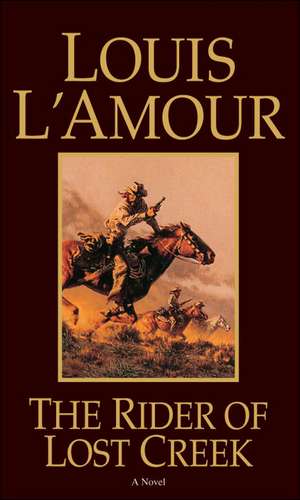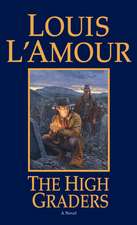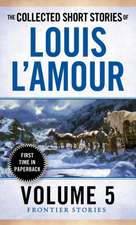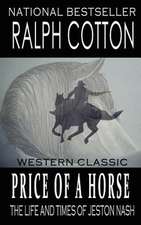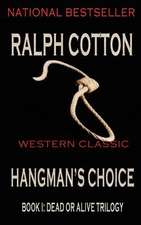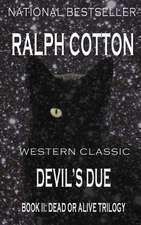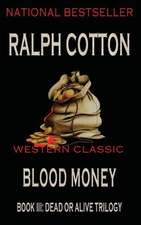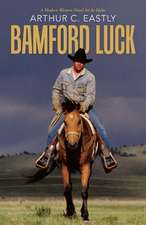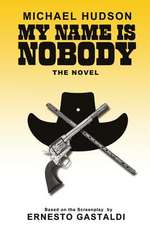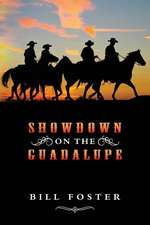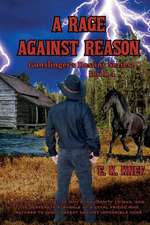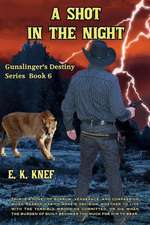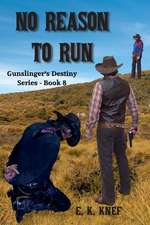The Rider of Lost Creek: Kilkenny
Autor Louis L'Amouren Limba Engleză Paperback – 30 apr 1982
Preț: 50.07 lei
Nou
Puncte Express: 75
Preț estimativ în valută:
9.58€ • 10.03$ • 7.93£
9.58€ • 10.03$ • 7.93£
Carte disponibilă
Livrare economică 15-29 martie
Livrare express 04-08 martie pentru 14.66 lei
Preluare comenzi: 021 569.72.76
Specificații
Notă biografică
Louis L’Amour is undoubtedly the bestselling frontier novelist of all time. He is the only American-born author in history to receive both the Presidential Medal of Freedom, and the Congressional Gold Medal in honor of his life's work. He has published ninety novels; twenty-seven short-story collections; two works of nonfiction; a memoir, Education of a Wandering Man; and a volume of poetry, Smoke from This Altar. There are more than 300 million copies of his books in print worldwide.
Extras
Chapter One
A lone cowhand riding a hard-pressed horse stepped down from the saddle and whipped the dust from his hat by a few stiff blows against his chaps. He stood for an instant looking up and down the street, crowded with buckboards, saddle horses and men. It was ten o'clock in the morning but Dodge was a twenty-four-hour town with thirty thousand head of cattle held on the grass outside of town, and more coming in every day.
Pushing his way through the bat-wing doors, he crossed the almost empty room to the bar. "Rye," he said, and glanced quickly around the room.
Only two men stood at the bar at this hour, a burly cattle-buyer and a drummer, the latter still only half awake and nursing a hangover from the night before.
Several other men played cards at the scattered tables, all within range of his voice.
"Never would've believed it," the cowhand said, "but they're stringin' wire on the plains of Texas!"
"Ain't practical," the cattle-buyer said dogmatically. "That there's a free range country and it should stay thataway. They'll never stand for it, anyway."
"Don't make no difference," the cowhand insisted. "They're doin' it." He glanced around the room again and his tone lowered. "Have you seen Kilkenny?"
There was a sudden stillness in the room. The cattle-buyer glanced uneasily at the bartender, who was suddenly very busy mopping the bar. For a long moment nobody spoke.
A cattleman at the nearest poker table picked up his cards, glanced at them, folded them into a neat packet and placed them on the table. "No, I haven't seen him, and I'm not likely to . . . Nor are you. He's a man who prefers to be left alone, and if you know anything about Kilkenny you know he's a good man to leave alone."
"I've been sent to find him," the puncher said stubbornly, "an' I'm to stay at it until I do."
A man had moved to the bar beside him. He was a square-shouldered young man with a look about him the cowhand did not like. Moreover, he knew the man by sight, as did a good many Texas men. Wes Hardin was a veteran of the Sutton-Taylor feud and one of the most feared men in Texas. When men talked of guns and gunfighters, they spoke of him in the same breath with Bill Hickok, Royal Barnes and the Brockman twins.
"What do you want with Kilkenny?" Hardin asked.
"Looks like a range war shapin' up in the Live Oak country," the puncher told them. "They're shapin' up for a shootin' war, sure enough."
"Don't look for Kilkenny, then," the cattle-buyer advised. "He's a man who minds his own affairs. He wouldn't be a paid warrior for any man. If you're looking for a fighting man for a range war, you'd better hunt somebody else."
"You won't have to look far, either," the bartender commented grimly. "If there's one gunman in this town, there's fifty . . . and fifty more nearly as good."
"This is different," the puncher replied. "My boss is an old friend of his."
"Somebody said he was riding with King Fisher's outfit," a gambler suggested.
"Don't you believe it!" the cattle-buyer said. "He never rode with any outfit except as a cowhand. He plays a lone hand, keeps pretty much to himself. Last I heard he was buffalo huntin' down near Adobe Walls with Billy Dixon and Bat Masterson."
The bartender stopped mopping the bar and refilled the cowboy's glass. "On the house," he said quietly. "You say you're bringing word from an old friend of Kilkenny's? Give us a name. There might be somebody here would pass the word along . . . and it's the only way you'll find him."
"Mort Davis," the cowhand tasted the rye. "Just tell him Mort Davis is in trouble. Kilkenny won't need more than that, for he's said to stick by his friends."
"That's what they say," the cattle-buyer commented, "and I do recall some story about Mort Davis."
"Hell," Hardin replied, "everybody knows that story! Kilkenny had a shoot-out with the three Weber boys and wiped them out, then some of their outfit chased him down . . . he was badly wounded . . . and Mort Davis had taken him in and was caring for him when that outfit came in and tried to take him away from Mort to lynch him.
"Mort Davis told them where they could go, and stood them off with a Spencer fifty-six until they decided they could have more fun somewhere else with less trouble. You don't forget a man like that . . . and Mort was a complete stranger to Kilkenny until he rode in there, half-dead."
"The word was out that Royal Barnes was huntin' Kilkenny," somebody commented. "He was kin to the Webers, you know. Half-brother, I think."
"Wouldn't that be something! Royal Barnes and Kilkenny! Two of the fastest gunmen in the West!"
"The difference is," the cattle-buyer replied, "that Barnes parades it. Kilkenny never did. He just happened to come out ahead in several gun battles with men who weren't smart enough to know better. He never looked for the name, and never wanted it."
"What's he look like?" somebody asked. "I never seen him."
"Nobody agrees," the cattle-buyer commented. "I've heard two dozen descriptions of the man, and every one of them different. He never seems to make himself known until the shooting starts and then he takes out right after.
"All they seem to agree on is that he's tall, minds his own affairs, and he's not inclined to talk very much. I also hear he's a top hand in any outfit, a damn good straight-up bronc rider and a good hand with a rope.
"He's done some freighting, rode shotgun on a stage a few times, and they say that during the War between the States he was a dispatch rider for the Union. He scouted for the army in some of the Indian wars, and he's Irish. Beyond that I don't think anybody knows very much."
"There's a whole colony of Irish down there in the Live Oak country," the gambler commented. "Brought in there in the 1840s, I think."
"There's French, Germans and Swiss, too," Hardin added, "several colonies around San Antone and New Braunfels."
"Where can a man get a bite to eat?" the cowhand asked.
"There's several restaurants, but if you can do with beef an' eggs, just set down over yonder and we can fix you up. They're fixin' breakfast for the boss right now," the bartender added, "and I'll just have them put on something extry."
When the bartender saw the puncher sit down at a table by himself, he filled a cup with coffee and walked over. "This is a good place to hear the news," he said quietly. "If I was you I'd just take my time eatin' and talk to the boss awhile and just keep your eyes open. This here is as good place as any to spread the word."
He added: "The way I figure it, you won't see Kilkenny, but if he hears Mort Davis is in trouble, he'll just come riding, and I have an idea you'll be able to go back home with a clear mind."
"Thanks." The cowhand gulped the coffee, glancing around the room as he did so. A dozen men had drifted in by ones and twos, and conversation flowered in the room. Here and there he could hear a word or two, and most of the talk was of cattle, horses and men, of trail drives and range conditions and the going price for beef on the hoof. All was familiar, even the brass spittoons and the brass rail along the bar.
Even many of the faces were faces he knew from Texas, or from trail drives to Abilene, Newton or Ellsworth, and if not the faces, the style of the men themselves. They came in all sizes and shapes, but there was a common resemblance. All were hard, tough men living out a dangerous game—driving cattle up a thousand miles of trail from Texas.
Through the fog of conversation he heard casual talk of Kilkenny. The mystery of the man fascinated them, and yet from all Mort had said, and from what the cattle-buyer had added, Kilkenny sought no mystery and no reputation, and simply went his own way.
Kilkenny, someone said, was faster than Hickok or Hardin, and had the nerve of Ben Thompson. One man had been in Missouri where two would-be bad men had cornered Kilkenny. Both died before they could fire a shot.
Some of the stories, the cowhand was sure, were simply fiction, or stories taken from what was known of some other gunfighter, somewhere.
"This bob-wire," somebody said, "won't last in Texas. It's free range and so it will always be. God made that grass for cows just like he did for buffalo, and nobody can rightfully fence it in. When the buffalo ran, it was free grass, and so it will always be."
"I don't know," another said doubtfully. "A man likes to know his own cattle, and to have his own range. There were millions of buffalo, but they never grazed the same ground two days in succession. They just kept moving along, north to south. If you get to holding cattle on the range they'll eat up all that grass in no time. I can understand the thinking of those who want fenced range, but personally, I'm against it."
"What about this range war?"
"Hell, it's no secret! I've heard the Brockman twins are in it, and half a dozen others just as mean. And who's to stop them?"
"What about the Rangers?"
"They're too busy with the Kiowas and the Comanches, or bandits raids from south of the border. Anyway, most of those Rangers would have friends on one side or the other."
"It's the hoe-men you've got to consider. Farmers comin' out from back east who know nothin' about range stock, and care less. They'll fence plow-land and pasture, and they'll fight to keep the cattle out. I think the day of free grass is finished!"
"Did you ever foller a trail herd?" a cowboy scoffed. "This here is range country, an' it ain't fit for farmin'. If they ever plow that land, the wind will blow it the hell into Mexico!"
The cowhand ran his fingers along his unshaven jaws. Now if there was time, a bath and a shave would be right nice, and maybe a look at the girls down on the Line before he started the long ride back to Texas.
Of course, it would not be the lonely ride it would have been a few years back, for there were trail herds scattered along the route all the way. He'd be able to ride the grub-line from chuck wagon to chuck wagon.
A big, broad-shouldered man with graying hair walked over and sat down with him, tucking a napkin into his collar. "You the rider from Texas? I'm John Hohner." He gestured about him. "I operate this place." Then he added, "I was born down in Fredericksburg."
"I am huntin' Lance Kilkenny," the cowhand said.
"He's a good man. You ride for Mort Davis? I knew Mort, some years back. Tall man . . . blond?"
"He's no such thing," the cowhand said. "He's a medium short man with dark hair and a broken nose. He's part Irish and part German and a mite English, and he's a darn good cattleman."
"All right," Hohner agreed, "but I can't trust any drifter who comes in here looking for Kilkenny. The man has enemies . . ."
"I thought they were mostly dead," the cowhand said.
"As a matter of fact, the only dead ones are those who tried to prove something. He's a peaceful man when left alone, and I respect that. He's never put himself forward—others have done it for him; and it's simply that in a country where most disagreements are settled with guns, he has come out ahead. He's good. There's no question of that. I've seen him in action twice, and I would never have believed the man lived who could get into action so fast or shoot so straight.
"I don't know where he is, but I do know how to get word to him. My best guess would be that he should know within the week that Mort Davis is in trouble. Knowing the man, my bet would be that within the hour—once he knows Mort's in trouble—Kilkenny will be riding south.
"He'll travel alone, I expect, and he'll choose his own way, and he's not likely to go down the Chis-holm Trail . . . or any well-traveled route."
"What about water?"
"He'll find water. He can find water where a coyote would die for lack of it, and he leaves no more trail than a ghost . . . I have that from a Delaware who tried to find him for the Army, when he was needed."
"Just so's he comes. I'm no hand with a six-shooter more'n the average, an' that's a tough outfit we're facin'. You tell him to ride careful, for they'll be out to kill any man they don't know on the idea that if he isn't one of theirs he must naturally be an enemy. If I get back to the ranch with my hair, I'll need all the luck in the world."
"All right," Hohner replied. "If you need anything for the trail, just tell Ray at the bar. He'll see that you have it."
Hohner paused a moment and then said, more quietly, "Son? If I were you I'd put all those ideas about a girl and a few drinks out of my mind. If you want to live to see Texas, you'll leave within the hour."
"Huh? Are you crazy? I just got in, an' the boss said—"
"I don't care what he said. Your boss isn't in Dodge. He's in Texas. By now there isn't a man on the street who doesn't know there's a rider in town from Texas hunting Kilkenny. And among those men who know are three of Webb Steele's riders who've been up here recruiting gun-hands.
"Now I've got a horse outside the back door. That horse is a fast black with a lot of guts and its wearing an HR brand. That horse now wears your bridle, saddle and rifle, and if you're half as smart as I think you are you'll ride north out of town to where Jake Breslin is holding the HR herd. You'll stay there until about sundown. And then you'll ride east about three or four miles and then cut south for Texas, avoiding any cattle herds you find.
"I'd ride all night, if I were you. There's another HR herd coming up the trail and you should run into it about three days south of here. Swap horses there and keep going."
A lone cowhand riding a hard-pressed horse stepped down from the saddle and whipped the dust from his hat by a few stiff blows against his chaps. He stood for an instant looking up and down the street, crowded with buckboards, saddle horses and men. It was ten o'clock in the morning but Dodge was a twenty-four-hour town with thirty thousand head of cattle held on the grass outside of town, and more coming in every day.
Pushing his way through the bat-wing doors, he crossed the almost empty room to the bar. "Rye," he said, and glanced quickly around the room.
Only two men stood at the bar at this hour, a burly cattle-buyer and a drummer, the latter still only half awake and nursing a hangover from the night before.
Several other men played cards at the scattered tables, all within range of his voice.
"Never would've believed it," the cowhand said, "but they're stringin' wire on the plains of Texas!"
"Ain't practical," the cattle-buyer said dogmatically. "That there's a free range country and it should stay thataway. They'll never stand for it, anyway."
"Don't make no difference," the cowhand insisted. "They're doin' it." He glanced around the room again and his tone lowered. "Have you seen Kilkenny?"
There was a sudden stillness in the room. The cattle-buyer glanced uneasily at the bartender, who was suddenly very busy mopping the bar. For a long moment nobody spoke.
A cattleman at the nearest poker table picked up his cards, glanced at them, folded them into a neat packet and placed them on the table. "No, I haven't seen him, and I'm not likely to . . . Nor are you. He's a man who prefers to be left alone, and if you know anything about Kilkenny you know he's a good man to leave alone."
"I've been sent to find him," the puncher said stubbornly, "an' I'm to stay at it until I do."
A man had moved to the bar beside him. He was a square-shouldered young man with a look about him the cowhand did not like. Moreover, he knew the man by sight, as did a good many Texas men. Wes Hardin was a veteran of the Sutton-Taylor feud and one of the most feared men in Texas. When men talked of guns and gunfighters, they spoke of him in the same breath with Bill Hickok, Royal Barnes and the Brockman twins.
"What do you want with Kilkenny?" Hardin asked.
"Looks like a range war shapin' up in the Live Oak country," the puncher told them. "They're shapin' up for a shootin' war, sure enough."
"Don't look for Kilkenny, then," the cattle-buyer advised. "He's a man who minds his own affairs. He wouldn't be a paid warrior for any man. If you're looking for a fighting man for a range war, you'd better hunt somebody else."
"You won't have to look far, either," the bartender commented grimly. "If there's one gunman in this town, there's fifty . . . and fifty more nearly as good."
"This is different," the puncher replied. "My boss is an old friend of his."
"Somebody said he was riding with King Fisher's outfit," a gambler suggested.
"Don't you believe it!" the cattle-buyer said. "He never rode with any outfit except as a cowhand. He plays a lone hand, keeps pretty much to himself. Last I heard he was buffalo huntin' down near Adobe Walls with Billy Dixon and Bat Masterson."
The bartender stopped mopping the bar and refilled the cowboy's glass. "On the house," he said quietly. "You say you're bringing word from an old friend of Kilkenny's? Give us a name. There might be somebody here would pass the word along . . . and it's the only way you'll find him."
"Mort Davis," the cowhand tasted the rye. "Just tell him Mort Davis is in trouble. Kilkenny won't need more than that, for he's said to stick by his friends."
"That's what they say," the cattle-buyer commented, "and I do recall some story about Mort Davis."
"Hell," Hardin replied, "everybody knows that story! Kilkenny had a shoot-out with the three Weber boys and wiped them out, then some of their outfit chased him down . . . he was badly wounded . . . and Mort Davis had taken him in and was caring for him when that outfit came in and tried to take him away from Mort to lynch him.
"Mort Davis told them where they could go, and stood them off with a Spencer fifty-six until they decided they could have more fun somewhere else with less trouble. You don't forget a man like that . . . and Mort was a complete stranger to Kilkenny until he rode in there, half-dead."
"The word was out that Royal Barnes was huntin' Kilkenny," somebody commented. "He was kin to the Webers, you know. Half-brother, I think."
"Wouldn't that be something! Royal Barnes and Kilkenny! Two of the fastest gunmen in the West!"
"The difference is," the cattle-buyer replied, "that Barnes parades it. Kilkenny never did. He just happened to come out ahead in several gun battles with men who weren't smart enough to know better. He never looked for the name, and never wanted it."
"What's he look like?" somebody asked. "I never seen him."
"Nobody agrees," the cattle-buyer commented. "I've heard two dozen descriptions of the man, and every one of them different. He never seems to make himself known until the shooting starts and then he takes out right after.
"All they seem to agree on is that he's tall, minds his own affairs, and he's not inclined to talk very much. I also hear he's a top hand in any outfit, a damn good straight-up bronc rider and a good hand with a rope.
"He's done some freighting, rode shotgun on a stage a few times, and they say that during the War between the States he was a dispatch rider for the Union. He scouted for the army in some of the Indian wars, and he's Irish. Beyond that I don't think anybody knows very much."
"There's a whole colony of Irish down there in the Live Oak country," the gambler commented. "Brought in there in the 1840s, I think."
"There's French, Germans and Swiss, too," Hardin added, "several colonies around San Antone and New Braunfels."
"Where can a man get a bite to eat?" the cowhand asked.
"There's several restaurants, but if you can do with beef an' eggs, just set down over yonder and we can fix you up. They're fixin' breakfast for the boss right now," the bartender added, "and I'll just have them put on something extry."
When the bartender saw the puncher sit down at a table by himself, he filled a cup with coffee and walked over. "This is a good place to hear the news," he said quietly. "If I was you I'd just take my time eatin' and talk to the boss awhile and just keep your eyes open. This here is as good place as any to spread the word."
He added: "The way I figure it, you won't see Kilkenny, but if he hears Mort Davis is in trouble, he'll just come riding, and I have an idea you'll be able to go back home with a clear mind."
"Thanks." The cowhand gulped the coffee, glancing around the room as he did so. A dozen men had drifted in by ones and twos, and conversation flowered in the room. Here and there he could hear a word or two, and most of the talk was of cattle, horses and men, of trail drives and range conditions and the going price for beef on the hoof. All was familiar, even the brass spittoons and the brass rail along the bar.
Even many of the faces were faces he knew from Texas, or from trail drives to Abilene, Newton or Ellsworth, and if not the faces, the style of the men themselves. They came in all sizes and shapes, but there was a common resemblance. All were hard, tough men living out a dangerous game—driving cattle up a thousand miles of trail from Texas.
Through the fog of conversation he heard casual talk of Kilkenny. The mystery of the man fascinated them, and yet from all Mort had said, and from what the cattle-buyer had added, Kilkenny sought no mystery and no reputation, and simply went his own way.
Kilkenny, someone said, was faster than Hickok or Hardin, and had the nerve of Ben Thompson. One man had been in Missouri where two would-be bad men had cornered Kilkenny. Both died before they could fire a shot.
Some of the stories, the cowhand was sure, were simply fiction, or stories taken from what was known of some other gunfighter, somewhere.
"This bob-wire," somebody said, "won't last in Texas. It's free range and so it will always be. God made that grass for cows just like he did for buffalo, and nobody can rightfully fence it in. When the buffalo ran, it was free grass, and so it will always be."
"I don't know," another said doubtfully. "A man likes to know his own cattle, and to have his own range. There were millions of buffalo, but they never grazed the same ground two days in succession. They just kept moving along, north to south. If you get to holding cattle on the range they'll eat up all that grass in no time. I can understand the thinking of those who want fenced range, but personally, I'm against it."
"What about this range war?"
"Hell, it's no secret! I've heard the Brockman twins are in it, and half a dozen others just as mean. And who's to stop them?"
"What about the Rangers?"
"They're too busy with the Kiowas and the Comanches, or bandits raids from south of the border. Anyway, most of those Rangers would have friends on one side or the other."
"It's the hoe-men you've got to consider. Farmers comin' out from back east who know nothin' about range stock, and care less. They'll fence plow-land and pasture, and they'll fight to keep the cattle out. I think the day of free grass is finished!"
"Did you ever foller a trail herd?" a cowboy scoffed. "This here is range country, an' it ain't fit for farmin'. If they ever plow that land, the wind will blow it the hell into Mexico!"
The cowhand ran his fingers along his unshaven jaws. Now if there was time, a bath and a shave would be right nice, and maybe a look at the girls down on the Line before he started the long ride back to Texas.
Of course, it would not be the lonely ride it would have been a few years back, for there were trail herds scattered along the route all the way. He'd be able to ride the grub-line from chuck wagon to chuck wagon.
A big, broad-shouldered man with graying hair walked over and sat down with him, tucking a napkin into his collar. "You the rider from Texas? I'm John Hohner." He gestured about him. "I operate this place." Then he added, "I was born down in Fredericksburg."
"I am huntin' Lance Kilkenny," the cowhand said.
"He's a good man. You ride for Mort Davis? I knew Mort, some years back. Tall man . . . blond?"
"He's no such thing," the cowhand said. "He's a medium short man with dark hair and a broken nose. He's part Irish and part German and a mite English, and he's a darn good cattleman."
"All right," Hohner agreed, "but I can't trust any drifter who comes in here looking for Kilkenny. The man has enemies . . ."
"I thought they were mostly dead," the cowhand said.
"As a matter of fact, the only dead ones are those who tried to prove something. He's a peaceful man when left alone, and I respect that. He's never put himself forward—others have done it for him; and it's simply that in a country where most disagreements are settled with guns, he has come out ahead. He's good. There's no question of that. I've seen him in action twice, and I would never have believed the man lived who could get into action so fast or shoot so straight.
"I don't know where he is, but I do know how to get word to him. My best guess would be that he should know within the week that Mort Davis is in trouble. Knowing the man, my bet would be that within the hour—once he knows Mort's in trouble—Kilkenny will be riding south.
"He'll travel alone, I expect, and he'll choose his own way, and he's not likely to go down the Chis-holm Trail . . . or any well-traveled route."
"What about water?"
"He'll find water. He can find water where a coyote would die for lack of it, and he leaves no more trail than a ghost . . . I have that from a Delaware who tried to find him for the Army, when he was needed."
"Just so's he comes. I'm no hand with a six-shooter more'n the average, an' that's a tough outfit we're facin'. You tell him to ride careful, for they'll be out to kill any man they don't know on the idea that if he isn't one of theirs he must naturally be an enemy. If I get back to the ranch with my hair, I'll need all the luck in the world."
"All right," Hohner replied. "If you need anything for the trail, just tell Ray at the bar. He'll see that you have it."
Hohner paused a moment and then said, more quietly, "Son? If I were you I'd put all those ideas about a girl and a few drinks out of my mind. If you want to live to see Texas, you'll leave within the hour."
"Huh? Are you crazy? I just got in, an' the boss said—"
"I don't care what he said. Your boss isn't in Dodge. He's in Texas. By now there isn't a man on the street who doesn't know there's a rider in town from Texas hunting Kilkenny. And among those men who know are three of Webb Steele's riders who've been up here recruiting gun-hands.
"Now I've got a horse outside the back door. That horse is a fast black with a lot of guts and its wearing an HR brand. That horse now wears your bridle, saddle and rifle, and if you're half as smart as I think you are you'll ride north out of town to where Jake Breslin is holding the HR herd. You'll stay there until about sundown. And then you'll ride east about three or four miles and then cut south for Texas, avoiding any cattle herds you find.
"I'd ride all night, if I were you. There's another HR herd coming up the trail and you should run into it about three days south of here. Swap horses there and keep going."
Textul de pe ultima copertă
Kilkenny owes Mort Davis his life, so when Davis finds himself caught in a violent struggle between two powerful and arrogant families, Kilkenny answers the call for help. He tries to broker a peace between the warring patriarchs, Webb Steele and Chet Lord, but soon realizes that Steele and Lord are merely pawns in a sinister plot that could destroy both men, their families... and anyone who gets in the way. It's a grab for money and power, involving a mysterious and reclusive beauty, a psychotic killer, and a dark figure from Kilkenny's past who's determined to get what he wants -- and what he wants most of all is Kilkenny dead.
Descriere
Next to the six-shooter, barbed wire most affected the way the West survived. In The Rider of Lost Creek, L'Amour spins a highly-charged tale about a prickly strand that took a bigger bite out of Live Oak country than any man could have ever anticipated, and became a tragic symbol for all that these men stood for and against.
